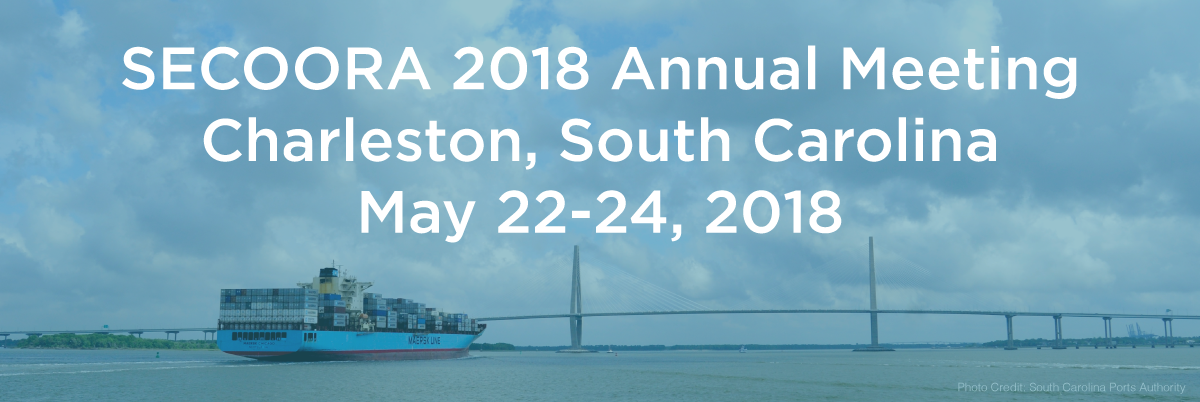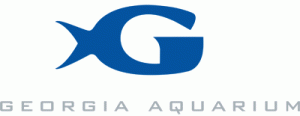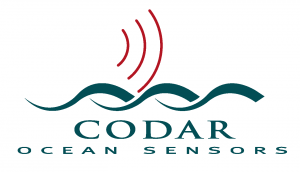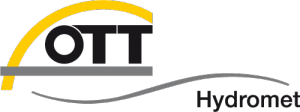
SECOORA’s Annual meeting brought together coastal ocean scientists from around the Southeast to Charleston, South Carolina on May 22-24. The theme of SECOORA’s meeting was the Blue Economy. The Blue Economy encompasses ocean and coastal dependent activities such as maritime transportation, tourism, fisheries, energy development, and more.
Three panels discussed different aspects of the Blue Economy – offshore resources, fisheries management, and local South Carolina perspectives on economic opportunities. Major findings on how SECOORA can assist in meeting stakeholder needs include:
- Opportunities exist for collaborative science both with Bureau of Ocean Energy Management and the private sector to research offshore resources in the Southeast. A strong dialogue needs to be established to define what research is needed to improve our understanding of the marine environment.
- Data must be transitioned into tools that community leaders can use for decision making. They should be easy and simple to use and understand.
- Private industries need longer-range weather forecasts than are currently available from NOAA’s National Weather Service.
- Dynamic oceanography was a term used by a fisheries panelist to highlight the need for both forecasts and hindcasts to inform stock assessments. However, consistent access to these modeling tools would need to be provided. Additionally, ecosystem assessments that provide climatologies of the Gulf Stream and associated eddies would be informative for stock assessments.
- Active and passive acoustic technology is an area for growth in terms of monitoring fisheries and other marine life. Currently SECOORA members are assisting the FACT network with fish tracking efforts in the South Atlantic; however, a regional plan is needed.
- In the Southeast, there are gaps in wave and current data. Investments in wave moorings and High Frequency radar are needed, as well as more monitoring of salinity, water column currents, and suspended solids.
- The local perspectives panel highlighted the very nearshore data needs of many stakeholders. SECOORA is currently making a limited investment in coastal stations on the West Coast of Florida and one station in Charleston Harbor, SC. Given the interests discussed, more coastal stations should be added in the Southeast, especially to help with alternative energy and Port operations.
- The very large economic impacts of ports, extreme weather, and wind development were noted. However, to get ports or other interests to invest in observing, a cost benefit analysis needs to demonstrate the value of any new observing infrastructure.
Click here to read the highlight story.
Presentations and Meeting Agendas
Tuesday May 22, 2018 – Agenda
SECOORA Principal Investigator Project Updates (Click here for PDF of SECOORA Principal Investigator project abstracts.)
Moorings
- Charleston Harbor Water Quality Site (Denise Sanger, South Carolina Department of Natural Resources) – PDF of Presentation | Abstract
- Carbon Dioxide Water Quality Monitoring at Grays Reef National Marine Sanctuary (Scott Noakes, University of Georgia) – PDF of Presentation | Abstract
- University of North Carolina Wilmington – Coastal Ocean Research Monitoring Program (Lynn Leonard, University of North Carolina Wilmington) – PDF of Presentation | Abstract
- University of South Florida Coastal Ocean Monitoring and Prediction System, Inshore Stations – (Mark Luther, University of South Florida) – PDF of Presentation | Abstract
- University of South Florida Coastal Ocean Monitoring and Prediction System, Modeling and Offshore Stations (Bob Weisberg, University of South Florida) – PDF of Presentation | Abstract
High Frequency Radar
- High Frequency Radar on the West Coast of Florida (Bob Weisberg, University of South Florida) – PDF of Presentation | Abstract
- High Frequency Radar Observing of the Florida Current (Nick Shay, University of Miami) – PDF of Presentation | Abstract
- WERA High Frequency Radars for Surface Currents in Georgia and North Carolina – (Dana Savidge, University of Georgia – Skidaway Institute of Oceanography) – PDF of Presentation | Abstract
- Shining a light (High Frequency Radar) on Ocean Currents in South Carolina (George Voulgaris, University of South Carolina) – PDF of Presentation | Abstract
- Surface Currents Offshore of North Carolina (Harvey Seim, University of North Carolina at Chapel Hill) – PDF of Presentation | Abstract
Gliders
- SECOORA Glider Observatory (Catherine Edwards, University of Georgia – Skidaway Institute of Oceanography) – PDF of Presentation | Abstract
Models and Product Development
- A Coupled Marine Environmental Assessment and Prediction System for the Southeastern U.S. Coastal Ocean in Support of Effective Marine Ecosystem-Based Management, Efficient Marine Operations, and Resilient Coastal Communities (Ruoying He, North Carolina State University) – PDF of Presentation | Abstract
- Integrated Decision Support and Management Tools for Adaptive Public Health Practices: An Early Warning System for Swimming Beach and Shellfish Harvesting Waters (Dwayne Porter, University of South Carolina) – PDF of Presentation | Abstract
- SECOORA Marine Weather Portal (Jennifer Dorton, SECOORA) – PDF of Presentation | Abstract
Other SECOORA Projects
- Southeast Coastal Ocean Acidification Network (Leslie Wickes, SECOORA) – PDF of Presentation | Abstract
- Southeast Disaster Recovery Partnership (Amanda Martin, University of North Carolina at Chapel Hill) – PDF of Presentation | Abstract
- National Ocean Service Stimulus Project – WebCAT (Mark Willis, Surfline) – PDF of Presentation | Abstract
- Total Water Initiative (Ruoying He, Fathom Science) – PDF of Presentation | Abstract
Wednesday May 23, 2018 – Agenda
SECOORA Members Business Meeting
- IOOS Association Update and Congressional Outlook (Josie Quintrell, IOOS Association Director) – PDF of Presentation | Biography
Supporting the Blue Economy: SECOORA Stakeholder Annual Meeting
- YSI / Xylem Gold Sponsor Presentation, MOTUS Buoy (Brad Kingsmore and Brock Houston, YSI / Xylem) – PDF of Presentation
- CODAR Gold Sponsor Presentation (Chad Whelan, CODAR)
- IOOS Program Office (Carl Gouldman, U.S. IOOS Director) – PDF of Presentation | Biography
Blue Economy Panel I: Perspectives on Offshore Resource Use and Management
Objective: Discuss offshore resources in the Southeast; and, research and modeling needs for safe and efficient infrastructure siting, beach nourishment, and inlet management.
- BOEM Marine Minerals Program Restoring and Protecting Our Nation’s Coasts through Stewardship of OCS Sand Resources (Doug Piatkowski, Marine Biologist, Marine Minerals Program, Bureau of Ocean Energy Management) – PDF of Presentation | Biography
- The Role and the Future of Public-Private Collaborations in the Blue Economy – An Energy Perspective (Ruth Perry, Marine Scientist and Regulatory Policy Specialist, Shell Exploration and Production Company) – PDF of Presentation (please email abbey@secooraorgpact.wpengine.com) | Biography
- Seafloor Geology and the Blue Economy (Scott Harris, Associate Professor of Geology and Director of Archaeology, College of Charleston) – PDF of Presentation | Biography
- Offshore Resource Use and Management – (Nicole Elko, Executive Director, South Carolina Beach Advocates) – PDF of Presentation | Biography
Student Opportunities Update
- SECOORA Data Challenge 2017 Winners
- SPLASSH into OA (Ocean Acidification) with SECOORA’s pH Data (John Mwaniki, Computer Science U.G. Student at KSU) – YouTube Video
- Development of a 5-Year Daily, Cloud-Free Sea Surface Temperature (SST) and Chlorophyll-a Reconstruction Dataset Using the Data Interpolating Empirical Orthogonal Functions (DINEOF) Method (Joseph B. Zambon, Ph.D) – PDF of Presentation
Blue Economy II: Data to support Fisheries Management
Objective: Highlight integrated physical oceanographic and biological research that supports fisheries research and management.
- Fisheries Observing Needs A View from The Water (Ben Hartig, Commercial Fisherman and Former Chairman of South Atlantic Fishery Management Council) – PDF of Presentation | Biography
- REEF Citizen Science Conservation Successes and Data Needs – (Lad Akins, Director of Special Projects, Reef Environmental Education Foundation) – PDF of Presentation | Biography
- Supporting Fisheries Management (John Quinlan, Research Fisheries Biologist, NOAA National Marine Fisheries Service, Southeast Fisheries Science Center) – PDF of Presentation | Biography
Blue Economy Panel III: Local Perspectives on our Blue Economy
Objective: Discuss business/private sector marine-related economic activities and identify priority gaps in data and research that are needed for business management and decision support.
- Surfline and the Blue Economy (Brian McNease, Advertising Operations Manager, Surfline/Wavetrak, Inc.) – PDF of Presentation | Biography
- South Carolina Ports Authority -The World Connects Here (Mark Messersmith, Permitting Manager, South Carolina Ports Authority) – PDF of Presentation | Biography
- The Blue Economy: Potential for Offshore Wind Energy Production in the Southeast (Paul Gayes, Director, Burroughs and Chapin Center for Marine and Wetland Studies, Coastal Carolina University) – PDF of Presentation | Biography
Public Forum: Extreme Events, the Blue Economy, and Ocean Observations
- Sea Turtles: The Ocean’s Canaries in the Coal Mine (Kelly Thorvalson, Conservation Program Manager, South Carolina Aquarium) – PDF of Presentation | Biography
- Race, Place and Environmental Justice (Omar Muhammad, Executive Director, Lowcountry Alliance for Model Communities) – PDF of Presentation | Biography
- Disasters, Emergency Management, and the Private Sector (Sarah Pickhardt, Private Sector Coordinator, South Carolina Emergency Management Division) – PDF of Presentation | Biography
Thursday May 24, 2018 – Agenda
- Data Access for Coasts and Oceans Workshop: SECOORA Public Data Portal, Analysis Tools and Practical Applications – PDF of Presentation
Meeting Materials
- Tuesday May 22, 2018 – Agenda
- Wednesday May 23, 2018 – Agenda
- Thursday May 24, 2018 – Agenda
- SECOORA Principal Investigator Project Abstracts
- Local Restaurant List
Board Materials
- SECOORA Conflict of Interest Policy
- SECOORA Conflict of Interest Policy Form
- SECOORA Members in Good Standing
- Proxy List 2018
- 2018 SECOORA Board of Directors Election- Official Ballot
- Institutional Member: Industry/Private Sector:
- Jeff Copeland (Weatherflow, Inc.) – CV
- Institutional Member: Academic/ Research/ Education Sector:
- Institutional Member: Public Agencies/ Non-Profit/ Other Sector:
- Roger Pugliese (South Atlantic Fishery Management Council) – CV
- At Large Seat- FL
- George Maul (Florida Institute of Technology) – CV
- At Large Seat- NC
- Mike Piehler (UNC at Chapel Hill) – CV
- At Large Seat- SC
- Institutional Member: Industry/Private Sector:
Thank you meeting sponsors!
 |
 |

|



